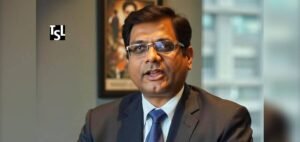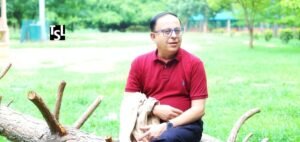Some leaders climb well-crafted ladders, and others build bridges where none exist. Dr. Sansriti Johri is one of the latter-a blue-ribboned changemaker who never sees hurdles as walls but as raw material for construction. As National Vice President of the World Human Rights Protection Commission for India, she holds titles that speak of achievement, but her strength is something far less tangible: the ability to hold firm when others yield, the eyesight to see injustice cloaked as the mantle of the ordinary, the strength to transform the machinery of the bureaucracy into instruments of human dignity.
Picture this: a woman who spent years traversing the stern corridors of government service finds herself thrust suddenly beyond her limits in ways that challenge the very core of her character. Dr. Johri conducted a high-risk surgery in August 2022 in Ghazipur at opium sampling time. She did not have a backup. There was only her, an amazing team, and a decision-compromise or stand firm. She chose the rock over the reed. That moment did not make her a leader; it revealed what fate had been sculpting all along. Her remarkable performance impressed those searching not just for ability, but for valor trapped in compassion.
What is so shocking about Dr. Johri’s story is not the dazzling array of avatars she dons (author, officer, editor, entrepreneur), but how naturally she weaves them into one seamless, immovable whole. She writes because words re remake minds. She serves because systems require integrity from within. She edits because plurality of voices want to be raised, not ruled. She builds because ideas without execution are mere noise. These dimensions blend together to form a leader who does not need permission to battle for justice. She just goes ahead, standing where others stand back, speaking when silence would be more convenient, building where destruction is imminent.
The Crucible That Forged a Leader
Every leader has a crucible moment- a test that either breaks them or transforms them into something stronger. For Dr. Johri, that moment arrived in August 2022 during India’s Opium Sampling Season at the Government Opium and Alkaloid Works in Ghazipur.
She stepped into the role of Joint Director (In-charge) when the stakes could not have been higher. The facility was implementing the OCTA system for the first time- an online platform designed to eliminate manipulation in morphine content testing. No other Group A officer was available; her colleagues were on leave. The responsibility landed squarely on her shoulders, carrying the weight of a sensitive, high-pressure operation where even minor errors could have serious consequences.
But Dr. Johri does not flinch in the face of pressure. Supported by an excellent team of brilliant officers, she led from the front. Yet leadership at this level demanded more than coordination; it required the courage to stand alone when necessary. Twice during that critical period, she faced obstacles that would have made others compromise. She did not. She stood firm like a rock, making decisions that few would dare to make, taking strong stands when the easier path beckoned with the comfort of silence.
The result? The task was accomplished, even before the target date, with complete accuracy. Her outstanding work output from her years as a Group A Officer in the Central Government had already been published online. The World Human Rights Protection Commission had been watching. They had first offered her membership in 2019. Now, witnessing her unwavering commitment to doing what is right and her fierce stance against everything unfair, they recognized in her exactly what they needed- a National Vice President for India who leads not with words alone but with proven action.
It was as if destiny had been preparing her all along, testing her sincerity, dedication, and capabilities through increasingly challenging situations. Her success at Ghazipur was confirmation that she was ready for the larger battle ahead- the fight for human rights and social justice across India.
San Edification: Planting Seeds of Knowledge Across Borders
Among the many initiatives Dr. Johri has championed, San Edification holds a special place. It is her brainchild, born from her conviction that knowledge, when shared generously, becomes the foundation for a better world. Launched in 2021, San Edification represents her innovative approach to knowledge sharing through podcasting.
The program produces expert content spanning Personal Development, Health and Fitness, and Vastu, making these podcasts available on major platforms including Spotify, Amazon, Apple Podcasts, Google Podcasts, and Audible. These digital seeds of wisdom now reach worldwide audiences, benefitting people across geographical and cultural boundaries.
But San Edification extends beyond knowledge dissemination. It embodies Dr. Johri’s commitment to women empowerment. She has transformed the program into a free platform where women can present their work and achievements to a global audience. She has presented awards to deserving individuals and organized e conferences that create global networking opportunities. The vision continues to expand, with specialized programs for children and teenagers in development, recognizing that the seeds planted in young minds today will blossom into the just society of tomorrow.
Reimagining Human Rights Protection in India
When Dr. Johri surveys the landscape of human rights in India, she sees both the distance travelled and the long road ahead. She recognizes a fundamental challenge: in the daily struggle to secure necessities and manage financial obligations, people often fail to recognize human rights violations when they occur- either to themselves or when they inadvertently deprive others of fundamental rights. Her vision begins with awareness, with education that enlightens minds to recognize injustice when it wears the mask of normalcy.
She has witnessed severe violations in numerous locations across India and has sworn to work upon them and set things right. She has assembled a dedicated team of World Human Rights Protection Commission members, ready to tackle challenging situations head-on. She harbours no illusions about the difficulty ahead. She anticipates facing opposition, acknowledges that progress may be gradual, but remains unwavering in her commitment to move upstream until she reaches her destination.
A Five-Pillar Vision for Sustainable Change
Dr. Johri’s long-term vision for strengthening India’s Human Rights Protection framework rests on a profound principle: rights must be lived, not just written. Laws matter, institutions matter, but they only become meaningful when people understand their rights, when institutions remain accountable, and when remedies are fast, fair, and accessible.
Her vision stands on five interconnected pillars: stronger and more responsive institutions that actively serve the people; genuine access to justice with speedy remedies; prevention of violations through education and community empowerment; accountable policing and public service; and data transparency with multi-stakeholder collaboration.
Woven through these pillars are cross-cutting priorities:
- Focused protection for vulnerable groups, including women, children, and differently-abled persons
- Stronger social protection systems to reduce economic drivers of abuse
- Appropriate use of technology for tele-legal aid and secure reporting apps, always with robust privacy safeguards.
The Heart and Mind of Rights: Storytelling and Education
Dr. Johri holds a deep conviction: storytelling and education are the heart and soul of any meaningful progress in human rights. Education empowers people with knowledge, critical thinking, and the ability to question injustice. Without education, people may experience oppression without recognizing it is happening to them. Education transforms passive subjects into active citizens capable of claiming and protecting their rights.
As an author, she has witnessed how narratives open dialogues on issues that society often hesitates to discuss.
From her administrative roles, she has realized that no policy or reform can sustain itself unless people emotionally connect with its underlying purpose. That is where storytelling plays its irreplaceable role. It humanizes causes and unites communities across boundaries of language, class, and culture.
Women as Architects of Social Change
When Dr. Johri speaks about women’s role in driving change in human rights and social justice, she speaks from the intersection of personal experience and strategic vision. She recognizes that women play a key role in shaping society, beginning at the most fundamental level. A child grows up in the embrace of their mother, observing her, learning from her, absorbing her values and worldview. Women as mothers have the utmost influence on an individual’s mind and mindset.
But her vision extends far beyond motherhood. She connects actively with women excelling across diverse fields- writers, preachers, mind coaches, spiritual healers, yoga instructors, and teachers. Women mould minds and shape society in countless visible and invisible ways.
She emphasizes surrounding oneself with people who inspire rather than drain energy. She encourages continuous learning, staying grounded, and maintaining empathy because real leadership is never about power; it is always about purpose. When intentions focus genuinely on making a difference, the path reveals itself, strength emerges from within, and clarity follows naturally.
Most importantly, she reminds women that they need not fit into someone else’s definition of a leader. They should lead in their own way with authenticity, courage, and compassion. That is what truly leaves a mark on society.
Building a Just Society: One Action at a Time
When Dr. Johri addresses individuals and organizations committed to building a just and inclusive society, her message combines idealism with pragmatism. She reminds them never to underestimate the power of consistent small actions driven by genuine intent. A just society is not built overnight; it grows through everyday choices, through how people treat each other, how they listen, and how they include those who have been unheard for too long.
For individuals, she advises starting where they are. “Speak up when you witness discrimination. Be conscious of your own biases. Use whatever privilege you possess to make space for others. Change does not always need a grand stage; it often begins in quiet conversations, in classrooms, and in workplaces where culture shifts one interaction at a time,” she states.
A Leader Shaping India’s Future
Dr. Johri embodies a new generation of leadership, one that refuses to accept injustice as inevitable, that leads with both heart and mind, and that understands power as a tool for service rather than domination. Her journey from a government officer facing patriarchal obstacles to becoming the National Vice President of the World Human Rights Protection Commission for India demonstrates that authentic leadership emerges not from seeking positions but from consistently standing for principles.
She proves that a woman can lead across multiple domains simultaneously, as an administrator, author, editor, entrepreneur, and advocate, not by fragmenting herself but by integrating these roles into a coherent vision of service.
In an era where cynicism often masquerades as sophistication, Dr. Johri represents something increasingly rare- a leader whose actions match her words, whose commitment runs deeper than convenience, and whose vision extends beyond her own advancement.
Dr. Johri is a force that is actively changing systems, teaching communities, and constructing infrastructure for long-term justice, not just a voice for the voiceless. She doesn’t just talk about equality; she works tirelessly and bravely every day to make it a reality for everyone. By doing this, she illuminates a road for others to follow, demonstrating that leadership is accessible to anybody who is prepared to take charge of change, who is prepared to stand their ground under pressure, and who is dedicated to leaving the world in a better state than when they found it.


